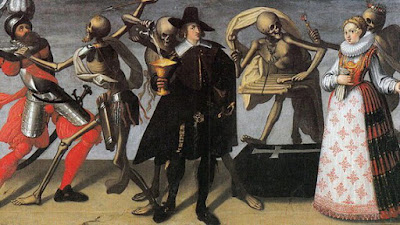“Are you greater than our father Jacob, who gave us the well and drank from it himself, as did his children and his livestock?”
The story of the Samaritan woman at the well, last Sunday’s reading, looks like another parable of the need to overcome the natural idolatry of parents or ancestors. This is especially true if we come from a dysfunctional family; it is always true in any case.
For two wells, two waters, and two authorities, are contrasted: the physical well, and the spiritual well of the Logos; the physical water and the spiritual, or “living,” water of the Gospel; Jesus and ancestral custom, personified as Jacob, the eponymous ancestor of Israel.
And the answer is obvious: Jesus is the higher authority.
“So the woman left her water pot, went away into the city.”
She discarded the water of her ancestors. This is an either-or choice. “He who does not despise his father for my sake is not worthy of me.” “Family values” are not a part of Christianity, but radically apart from Christianity.
The point is signed and underlined by her being a Samaritan. The Samaritans and the Jews had irreconcilable differences regarding the proper place of temple worship; as the story reminds us. Both cannot be right. And Jesus unambiguously tells her her ancestors were wrong.
“You worship that which you don’t know. We worship that which we know; for salvation is from the Jews.”
So she faces the eternal human dilemma: accept the unconsidered assumptions inherited from your father, who at best was no more than a man, or fight through for truth.
It is here perhaps that it becomes significant that she is apparently an outcast in her own community: coming at the unseasonable hour to get her daily water, to avoid encountering others. It is naturally enough those kicked to the bottom of the social totem pole who will find it easiest to see the shared delusions. They obviously have less to lose. See the Beatitudes on this. Children are also more apt to see, having not yet been so thoroughly indoctrinated. “For such is the Kingdom of God.”
I had noted previously that the woman must have been socially rejected because she was living in adultery. I was wrong. By the rules of ancient Israel, concubinage was respectable; consider Abraham’s concubine Hagar, the mother of Ishmael.
She was more likely to have been rejected for having five husbands. A surprising fact; so surprising that it proves Jesus was not just using intuition or playing probabilities, but had true supernatural knowledge. There are two possibilities: either the husbands divorced her, socially branding as a terrible wife; or they died, suggesting she was a jinx. Or a poisoner. Either would explain her social isolation. And either would amount to a profound experience of rejection.
I think we can also infer that she must necessarily also have been extremely attractive and/or accomplished, to have had five or six suitors despite this.
When the woman asks Jesus for the living water, why does he respond, “go, call your husband?” Why need her husband be involved?
Precisely because this is a social problem, a sin of the fathers visited upon the fourth generation. It would not be enough for her to see the truth, so long as she is committed, through marriage, to that corrupted social order. Unless she is, like Peter, to abandon spouse and family, they too must be brought along.
The woman responds that she has no husband. Jesus agrees that this is true, and reveals that he knows her entire marital history.
But if he knows her entire marital history, and knows this to be true, why did he tell her to bring her husband?
The point is that she both has and does not have a husband, depending on how you look at it, surely. The reference might be to concubinage, in which case Jesus might be accused of having spoken with less than perfect accuracy on the first occasion. This is not a plausible inference, however, since he is omniscient, and immediately demonstrates this. It seems more likely that the woman actually did have a husband, and was lying.
Why would she lie?
Oh gentle reader, you are innocent in the ways of romance. This woman has just met a handsome stranger at a well. Meeting at a well is the usual first act of a Biblical romance—Jacob himself, whose well this is, met his wife at it. This appears to be a woman with a reputation for playing the field, as it were, and who is apparently naturally highly attractive. Admitting she is married might kill the fun.
If so, she actually has had six husbands, counting the present one, and Jesus would amount to the projected seventh—a magical number for the Bible.
So when Jesus says her present husband is not really her husband, he is making a more general point, about family ties.
We all both do and do not have earthly fathers; for our true father, Jesus reminds us elsewhere, is always and only our father who is in heaven. We all both do and do not have husbands; for our true husband is always Jesus, the Seventh, the Sabbath spouse. Earthly spouses are, in the end, transitory and arbitrary, like well water. Any five or six might do.
We must not elevate family ties to divine status; and this is the usual temptation.
“So when the Samaritans came to him, they begged him to stay with them. He stayed there two days. Many more believed because of his word. They said to the woman, ‘Now we believe, not because of your speaking; for we have heard for ourselves, and know that this is indeed the Christ, the Savior of the world.’”
This fulfills Jesus’s requirement that the Samaritan woman bring her husband. She brought the entire community, and they had to be converted as a group.





































